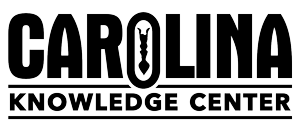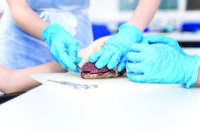View the replay to learn practical classroom activities for students to build biotech skills.
Even before the coronavirus global pandemic and the resulting need for vaccine research and development, there was a shortage of skilled biotech workers. The additional challenges of widespread school disruptions and learning loss among students have only increased the need for vigorous biotech instruction.
Carolina and its partners, many of whom are national research facilities, believe teachers are in a unique position to stem learning loss and continue toward the goal of producing more well-trained biotech professionals.
Additional Reading: The Biotech Labs That Launch Careers
Event Agenda
Each presentation will be 30 minutes.
Keynote and Welcome:
Dr. David Stegall
Deputy State Superintendent of Innovation, NC Department of Public Instruction
The Importance of STEM Teaching and Learning Now

HudsonAlpha
Presenter: Adam Hott
Topic: Interrogating the Evidence
Teachers know well that data analysis is a key skill that successful science students must master. Yet relatively few classroom activities provide opportunities for students to wrestle with the analysis portion of data analysis. Most classroom data-based activities are either convergent, where all students are working toward the same correct answer, or divergent, where multiple interpretations are acceptable, and the focus is on the justification.
“Interrogating the Evidence” bridges the gap between those two approaches. The activity is based on a claim-evidence-reasoning model that asks students to justify a claim, but there is a correct answer for each case. Additionally, students are asked to do more than analyze a single set of data. They are presented with analyzed data outputs (graphs, charts, tables) and asked to synthesize those to come up with a justifiable explanation.
The exercise of synthesizing many different forms of data that may appear to conflict with one another on the surface is intentional and provides a real-world data analysis experience for students that mirrors the reality of modern scientific reasoning.

miniPCR
Presenter: Ally Huang
Topic: mRNA Vaccines
Understanding the science behind mRNA vaccines and why they are different from traditional vaccines requires a grasp of the central dogma of molecular biology. We will demonstrate how cell-free technology and fluorescent outputs can be used to directly visualize the flow of genetic information, from DNA to RNA to protein, all in real time and with minimal preparation. This hands-on lab will allow your students to see transcription and translation and understand how mRNA serves as a template for protein production in mRNA vaccines.

DNA Learning Center (DNALC)
Presenter: Dr. Bruce Nash
Topic: PTC: Using a SNP to Predict Bitter Tasting Ability
The ability to taste the bitter compound phenylthiocarbamide (PTC) is often used to illustrate Mendelian inheritance. Three single nucleotide polymorphisms (SNPs) in the gene encoding the PTC taste receptor strongly affect tasting ability.
Learn how to lead DNA isolation from student cheek cells while working at home so you can genotype the most diagnostic SNP, then compare student tasting ability to predictions from their genotype. Students discover that PTC tasting is genetically more complex than the original model. This experiment is a close analog to how precision or personalized medicine uses genotypes to predict drug response.

Biotility (BACE Program, University of Florida)
Presenters: Houda Pruitt, Stephanie DeMarco, and Tiara King
Topic: Current Good Manufacturing Practices (cGMPs)
Companies that manufacture drugs, food, and cosmetics must follow current good manufacturing practices (cGMPs) to ensure their products are safe and effective. Compliance is regulated by the Food and Drug Administration (FDA). This enables companies to minimize cases of contamination, mix-ups, and other errors and protects the consumer from purchasing a product that does not work or might even be dangerous.
As the bioscience industry continues to grow, student understanding of industry practices is critical to preparation for these career opportunities. In this session, we will introduce concepts of cGMPs by mirroring a process that is familiar to everyone—making food! The objectives of the activity are to understand the complexity of a cGMP process, identify departmental roles, and gain appreciation of the teamwork, communication, and cooperation that must exist between the departments.
We will briefly cover cGMPs and departmental roles (e.g., quality assurance, quality control, and manufacturing), and demonstrate their functions by making a batch of cGMP-compliant snack mix. All departments must work together, using the appropriate regulatory practices and documentation, to manufacture the product, test the product to determine whether it meets the quality specifications, and then approve or reject the product based on those results. The session will include discussion of relevant framework content and skills as well as strategies and best practices for student success.

BioBuilder
Presenter: Racquel Kim Sherwood, Ph.D.
This activity will focus on a phenomenon called fluorescence, which generates light and is often used by scientists and engineers to “read out” activity in cells. The activity will include an introduction for how fluorescence is used in bioengineering (green fluorescent mice, DNA sequencing). Participants will then measure how much fluorescence there is in a sample. They will use a yellow highlighter, an eye dropper, and water to make dilutions, and a cell phone to capture–then measure–the intensity of each sample under blue light.

Illumina
Presenter: Vanessa Light
Illumina, a life science company headquartered in San Diego, CA will be presenting various opportunities for classrooms to access genomics curriculum and industry connections. Their genomic literacy programs empowers teachers to create meaningful experiences for students around genomics and inspire them to pursue careers in life sciences. In this session, the team from Illumina will share curriculum and resources available for teachers to use in your classroom. They will also share about their most recent Future is Bright campaign that connected over 10,000 teachers, students, and learners to our genomic literacy programs throughout the month of April to celebrate DNA Day. The Future is Bright symbolizes not only the future of genomics, but the bright future ahead for the students and teachers.
Concluding Remarks
This event is a follow-up to the extremely well-received Carolina Launches Biotech Careers held in October 2020. More than 600 teachers viewed presentations on biotech careers. See the event recap.




